

Red-Ink Republicans, Revisited and Reviled. The post-New Deal Republican party has delivered endless strings of deficits and debt.

That is their historic legacy to America, the bare fact on the ground that unfortunately requires endless repetition to impart the reality, and counter the tea-party fantasy of fiscally irresponsible Democrats. Also required is a catchy moniker that encapsulates that reality: Red-Ink Republicans Use it. Everywhere. The rise of Austerity politics... This past Sunday, I appeared on Up With Chris Hayes, where I spoke briefly about the rise of austerity politics in the Democratic Party (begin video at 2:13).

My comments were sparked by Bruce Bartlett’s terrific piece “‘Starve the Beast’: Origins and Development of a Budgetary Metaphor” in the Summer 2007 issue of The Independent Review. Barlett is a longtime observer of the Republican Party, from without and within. He was a staffer for Ron Paul and Jack Kemp, as well as a policy adviser to Ronald Reagan and a Treasury official under George HW Bush. The Nation: How The Austerity Class Rules DC. Hide caption New York Times columnist David Brooks speaks during a taping of 'Meet the Press' at the NBC studios April 20, 2008 in Washington, DC.
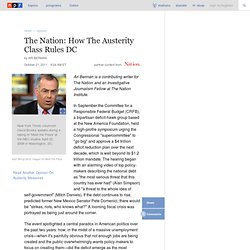
What Greece Means. How the Austerity Class Rules Washington. In September the Committee for a Responsible Federal Budget (CRFB), a bipartisan deficit-hawk group based at the New America Foundation, held a high-profile symposium urging the Congressional “supercommittee” to “go big” and approve a $4 trillion deficit reduction plan over the next decade, which is well beyond its $1.2 trillion mandate.
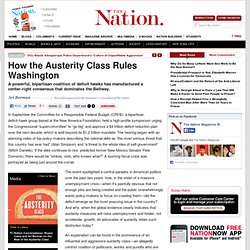
The hearing began with an alarming video of top policy-makers describing the national debt as “the most serious threat that this country has ever had” (Alan Simpson) and “a threat to the whole idea of self-government” (Mitch Daniels). If the debt continues to rise, predicted former New Mexico Senator Pete Domenici, there would be “strikes, riots, who knows what?” The Destructive, Ideological Push for Austerity. Alan Blinder: Alan Blinder: Stimulus Isn't a Dirty Word, by Alan Blinder, Commentary, NY Times: A debate now rages in Europe over whether fiscal austerity—that is, higher taxes and less spending—helps or hinders growth. ...
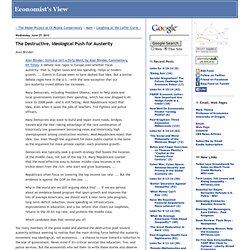
Events in Europe seem to have dashed that idea. But a similar debate rages here in the U.S. —with the lone exception that our pro-austerity crowd abhors tax increases. ... Many Democrats, including President Obama, want to help state and local governments maintain their spending, which has now dropped 6.4% since its 2008 peak—and is still falling. Many Democrats also want to build and repair more roads, bridges, tunnels and the like—taking advantage of the rare combination of historically low government borrowing rates and historically high unemployment among construction workers. Austerity Kills: How the EuroCrisis is Being Used to Break the Social Contract. Austerity has never worked.
Last week saw a string of bad economic news reports.
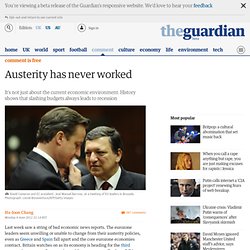
The eurozone leaders seem unwilling or unable to change from their austerity policies, even as Greece and Spain fall apart and the core eurozone economies contract. Britain watches on as its economy is heading for the third consecutive quarter of contraction, with an unexpectedly sharp fall in manufacturing. Last week's jobs figures confirmed that the US recovery is stuttering. The largest developing economies that have so far provided some support for world demand levels – especially India and Brazil but even China – are slowing down too. Four years after the financial crisis began, many rich capitalist economies have not recovered their pre-crisis output levels.
Thomas Frank: We Should Avoid the Austerity Trap. Blogging the Zombies: Expansionary Austerity – Birth. Another instalment in the new draft chapter on Expansionary Austerity, which I’m writing for the paperback edition of Zombie Economics.
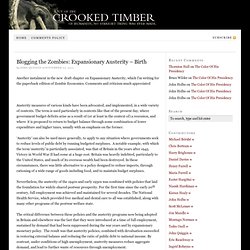
Comments and criticism much appreciated Austerity measures of various kinds have been advocated, and implemented, in a wide variety of contexts. The term is used particularly in contexts like that of the present day, where government budget deficits arise as a result of (or at least in the context of) a recession, and where it is proposed to return to budget balance through some combination of lower expenditure and higher taxes, usually with an emphasis on the former.
‘Austerity’ can also be used more generally, to apply to any situation where governments seek to reduce levels of public debt by running budgeted surpluses. Blogging the Zombies: Expansionary Austerity – Life. Blogging the Zombies: Expansionary Austerity – After the Zombies. This is the final draft section of the new chapter of my Zombie Economics book, on Expansionary Austerity.

As before comments are welcome. That includes everything from typos and suggestions for better phrasing to substantive critiques of the argument. If I can get organized, I will try to post the edited version of the entire chapter and invite another round of comments. As an aside, I just got an email link to the Journal of Economic Literature (behind a login screen), which contains Stephen Williamson’s review of my book, including his claims that both the Efficient Markets Hypothesis and DSGE macro are devoid of any implications.
I bet that if I had submitted an article to any publication of the American Economic Association making such claims, it would have been shot down in flames by the referees. Expansionary austerity: some shoddy scholarship. I’ve just read ‘Tales of Fiscal Adjustment’ by Alesina and Ardagna, which appears to be the founding text for the idea of expansionary austerity.

The level of scholarship, at least as it applies to Australia (which is their first illustration) is exceptionally poor, to the extent that it requires a rescuscitation of the ancient Internet tradition of Fisking. I’m going to quote excerpts from their text (about 50 per cent of the total), and intersperse them with my comments. In 1985, a single-party left-wing government took office and launched a stabilization plan to correct the internal and external imbalances (the current account deficit was 4.13% of GDP and the total deficit/GDP ratio was above 3% in 1984). The Labor government was elected in 1983, not 1985, in the early stages of recovery from a deep recession. There were no cuts in unemployment benefits. Capital taxation was rationalized. OK, I guess, except that ‘rationalized’ in this context, typically means ‘reduced’. The Austerity Agenda - NYTimes.com.